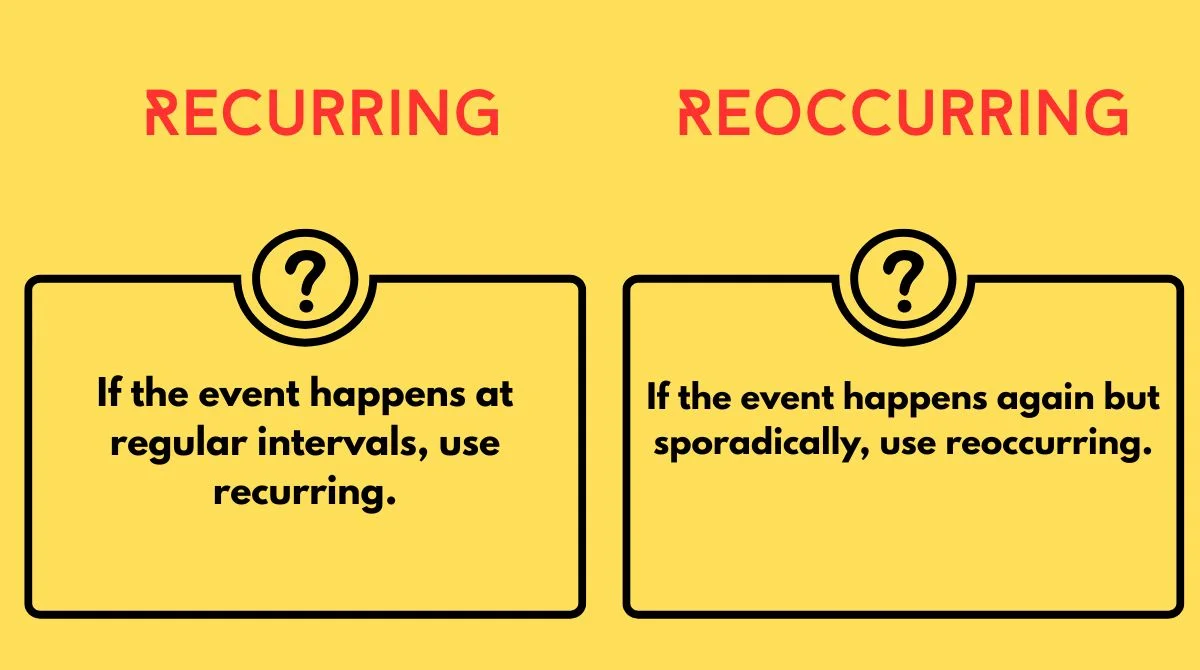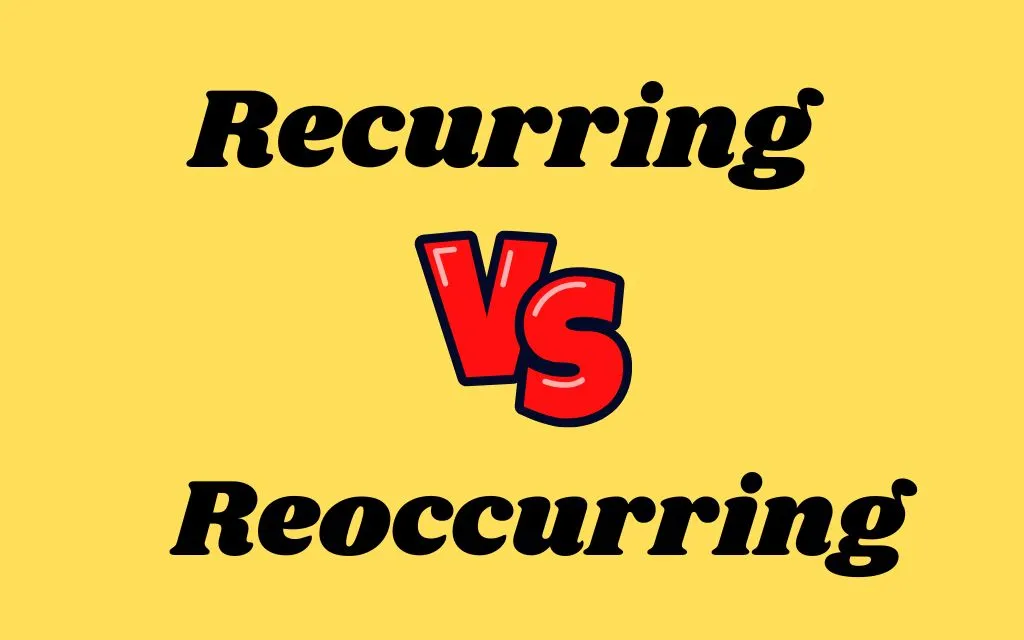Last updated on September 14th, 2025 at 12:05 pm
The English language is full of words that seem almost identical yet carry subtle differences in meaning.
Recurring and reoccurring are two such words that often confuse even native speakers. While both relate to events happening more than once, their nuances set them apart.
This guide will explore their definitions, historical roots, and practical applications to help you use them correctly in your writing and speech.
“Recurring” and “reoccurring” may seem similar, but they have distinct meanings. “Recurring” refers to regular repetition, while “reoccurring” means something happens again without a set pattern. Learn how to use them correctly!
Decoding the Definitions: Recur vs. Reoccur
At first glance, recur and reoccur may appear interchangeable, but they have distinct meanings:
- Recur (verb): To happen repeatedly or at regular intervals.
- Example: “The meetings recur every Monday.”
- Reoccur (verb): To happen again, but without any implication of regularity.
- Example: “The power outage reoccurred last night.”
The key distinction lies in frequency and expectation. Recurring events happen periodically, whereas reoccurring events happen again but not necessarily in a repeated pattern.
The Original Latin Roots and English Evolutions
Understanding the etymology of words often sheds light on their meanings. Here’s how these terms evolved:
| Word | Latin Origin | Meaning in Latin | Evolution in English |
|---|---|---|---|
| Recur | recurrere | “To run back” | Implies repetition or returning at intervals |
| Reoccur | occurrere | “To happen” | Implies happening again without set frequency |
Since recurrere means “to run back,” it makes sense that recurring events cycle back periodically. Meanwhile, reoccur simply stems from occurrere, which means “to happen,” reinforcing the idea that it just means “to happen again.”
Breaking Down the Frequency Factor
One of the most significant distinctions between these terms lies in how often the event happens:
- Recurring: Happens regularly and predictably.
- Reoccurring: Happens again, but without a set pattern.
Examples in Context
| Scenario | Correct Word | Explanation |
| A monthly subscription billing cycle | Recurring | It happens at a fixed interval. |
| A random earthquake in the same region | Reoccurring | It happens again but unpredictably. |
| A seasonal flu outbreak | Recurring | It follows a seasonal pattern. |
| A car breaking down unexpectedly | Reoccurring | It happens more than once but randomly. |
By examining these examples, you can see why choosing the right term matters in clear communication.
The Nuances of Usage in American English
Both words exist in American English, but recurring is significantly more common. You’re far more likely to encounter it in various contexts, such as:
- Finance & Business: “Recurring revenue streams”
- Medicine & Health: “Recurring migraines”
- Entertainment & Media: “A recurring guest star on a TV show”
- Technology & Software: “Recurring payments on a subscription plan”
On the other hand, reoccurring is less frequently used and mainly appears in contexts where something happens multiple times without a clear schedule:
- “Flooding in the area has been reoccurring due to climate change.”
- “His headaches have been reoccurring for the past few months.”

When to Opt for ‘Recurring’ Over ‘Reoccurring’
If you’re unsure which word to use, follow these simple guidelines:
- If the event happens at regular intervals, use recurring.
- If the event happens again but sporadically, use reoccurring.
Quick Trick to Remember:
- Recurring = Regular (Both start with “R”)
- Reoccurring = One-off reappearance
Exploring Examples to Highlight Differences
Common Phrases with “Recurring”
- Recurring dream
- Recurring theme in literature
- Recurring expenses
- Recurring subscriptions
Common Phrases with “Reoccurring”
- A reoccurring technical glitch
- A reoccurring software bug
- A reoccurring allergy reaction
If the event follows a predictable cycle, recurring is correct. If it happens again but randomly, reoccurring fits better.
Linguistic Insights: Recurrence and Reoccurrence Compared
These two nouns follow the same distinction:
- Recurrence: The act of happening regularly.
- Example: “The recurrence of the flu each winter is expected.”
- Reoccurrence: The act of happening again, without frequency.
- Example: “The reoccurrence of a security breach surprised the company.”
| Noun Form | Meaning |
| Recurrence | Happens regularly, expected |
| Reoccurrence | Happens again but unpredictably |
Common Misconceptions and Clarifications
1. Can reoccurring be used instead of recurring?
Technically, yes—but it’s less common and might sound awkward. Stick to recurring when discussing regular cycles.
2. Is reoccur a proper word?
Yes, but it’s much rarer in usage compared to recur. Many style guides recommend using recur instead.
3. Do British and American English treat these words differently?
No, the distinction remains the same in both varieties of English.
4. Can an event be both recurring and reoccurring?
Not at the same time! An event is either regular (recurring) or sporadic (reoccurring).

Conclusion
The difference between recurring and reoccurring may be subtle, but it’s important for clarity in communication. Remember:
- Use “recurring” for events that repeat in a predictable manner.
- Use “reoccurring” for events that happen again but irregularly.
By keeping this distinction in mind, you’ll ensure your writing is precise, professional, and grammatically accurate. If in doubt, recurring is almost always the safer choice!
